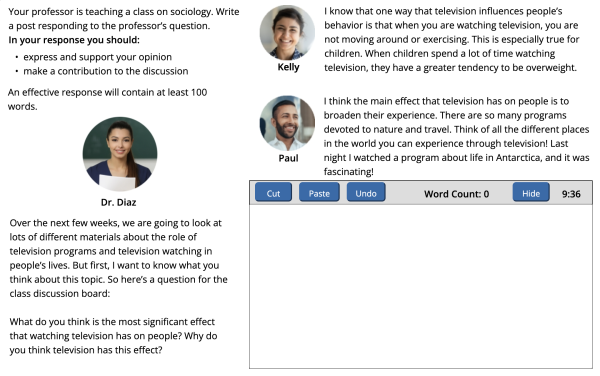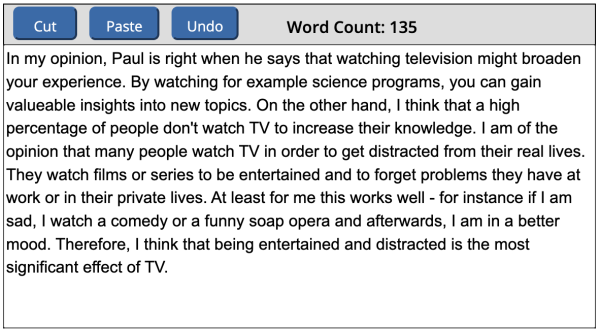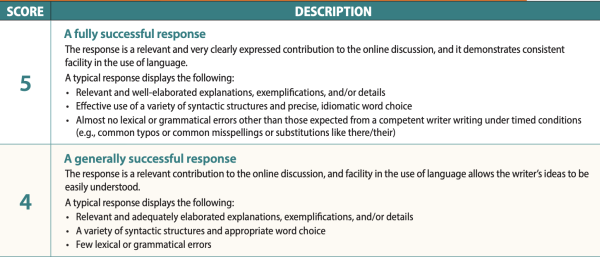新しいTOEFL Writing問題 “Academic Discussion” の評価を分析する その2(評価点5になる理由)
» 新しいTOEFL Writing問題 “Academic Discussion” の評価を分析する その1(評価点3になる理由)
の続きです。今回は以下のAcademic Discussion問題に対する評価点5のサンプル回答を紹介し、ETSによる評価の根拠について解説します。

以下は、評価点5の回答例Bを試験画面に書き込んだイメージ。
回答例B:

以下の回答例Bと、ETSによる評価とその根拠を一読してください。
回答例B:
In my opinion, Paul is right when he says that watching television might broaden your experience. By watching for example science programs, you can gain valueable insights into new topics. On the other hand, I think that a high percentage of people don’t watch TV to increase their knowledge. I am of the opinion that many people watch TV in order to get distracted from their real lives. They watch films or series to be entertained and to forget problems they have at work or in their private lives. At least for me this works well – for instance if I am sad, I watch a comedy or a funny soap opera and afterwards, I am in a better mood. Therefore, I think that being entertained and distracted is the most significant effect of TV.
135 words
Rationale:
This response is in the high writing proficiency range. It would probably earn the score of 5 based on the Academic Discussion Scoring Rubric. The writer conveys complex and well-argued ideas that contribute nicely to the discussion. While the writer mentions Paul’s point of view, the writer does not just repeat it. Instead, the writer takes Paul’s ideas as the starting point, and goes on to present a different point of view, arguing that watching TV is not mainly educational but rather a relaxing experience. The writer then goes on to develop this point of view, explaining why people need to relax, and providing the writer’s own personal experiences: why the writer usually watches TV, which programs, and so on. The language the writer uses has a nice variety, both in how the sentences are formed and in the range of the vocabulary used. There are almost no errors; the word “valuable” in the second sentence is misspelled, but that may be expected from even competent writers writing under timed conditions, as the Scoring Rubric explains.
では評価点5になるrationale「論理的根拠、論拠」について説明します。
> This response is in the high writing proficiency range. It would probably earn the score of 5 based on the Academic Discussion Scoring Rubric.
high writing proficiency rangeだと評価点4か5になりますが、この回答はScoring Rubricsに基づくと評価点5レベルとのこと。評価における4と5の違いについてはあとで説明します。
> The writer conveys complex and well-argued ideas that contribute nicely to the discussion. While the writer mentions Paul’s point of view, the writer does not just repeat it.
「複雑で上手く論じた考えを伝え、議論にかなり貢献している。Paulの意見に言及しているものの、単に繰り返しているだけではない」という内容ですが、ここで大切なのは、他の学生の意見を「単に繰り返してはいない」という部分。他の2人の学生の意見の片方または両方に対して賛成・反対と述べるだけでは、議論への貢献になりません。
大切なのは自分の意見に対する理由や説明、理由に対する具体例、説明での詳細。
自分の考えを理解してもらうために 理由や説明、具体例、詳細 を「分かりやすく」伝えることが求められます。
ちなみにPaulは以下のように書いていましたが
I think the main effect that television has on people is to broaden their experience. There are so many programs devoted to nature and travel. Think of all the different places in the world you can experience through television! Last night I watched a program about life in Antarctica, and it was fascinating!
回答例Bでは、Paulが書いた broaden their experience 「経験(の幅)を広げる」という表現を回答の中で使っていました。Academic Discussionではこのように学生の回答内の表現を借用することができます。
In my opinion, Paul is right when he says that watching television might broaden your experience. By watching for example science programs, you can gain valueable insights into new topics.
その後、Paulとは異なる視点で(「日常生活での問題を忘れて楽しむためにテレビを見る人が多い」という)自分の意見を説明、個人的体験の提示により説得力のあるものにしています。
On the other hand, I think that a high percentage of people don’t watch TV to increase their knowledge. I am of the opinion that many people watch TV in order to get distracted from their real lives.[意見]They watch films or series to be entertained and to forget problems they have at work or in their private lives.[説明、理由]At least for me this works well – for instance if I am sad, I watch a comedy or a funny soap opera and afterwards, I am in a better mood.[個人的体験、具体例]Therefore, I think that being entertained and distracted is the most significant effect of TV.
Rationaleでは以下のように回答例Bの展開を説明していました。
> Instead, the writer takes Paul’s ideas as the starting point, and goes on to present a different point of view, arguing that[意見]watching TV is not mainly educational but rather a relaxing experience. The writer then goes on to develop this point of view, explaining why[説明、理由]people need to relax, and providing the writer’s own personal experiences[個人的体験、具体例]: why the writer usually watches TV, which programs, and so on.
そして表現力、ミスについての言及が続きます。
> The language the writer uses has a nice variety, both in how the sentences are formed and in the range of the vocabulary used. There are almost no errors; the word “valuable” in the second sentence is misspelled, but that may be expected from even competent writers writing under timed conditions, as the Scoring Rubric explains.
ここでは「文の構成」「語彙の範囲」ともにかなり多様であると褒めています。また「ほとんどエラーがない」とも。
回答例Bを読んで「この回答の語彙は評価点5が取れるほどのレベルではないのでは?」という疑問を持つ人がいるかと思います。難しめの表現が使われてはいないので。確かにそうですが、全体的に自然な正しい英語で分かりやすく説明されています。
またAcademic Discussionでは、他の学生にとって読みやすい内容を書き、議論に貢献することが求められるので、Independent Writingのエッセイとは異なり、自分の表現力をアピールする場ではないとも言えます。高評価を取るために必要な表現レベルについてはETSが今後発表する回答サンプルなどを分析します。
最後に Scoring Rubrics「評価基準」での評価点5と4の違いについて。上で評価点5と4はともに “high writing proficiency rang'” であると伝えましたが、では何が異なるのか?
» TOEFL iBT Write for an Academic Discussion Rubrics(2ページ目)

以下の太字が5と4の異なる箇所。多くはfully successful [5], generally successful [4]やwell-elaborated [5], adequately elaborated [4] のように採点官の感覚に委ねられるような違いになっていますが、青字のところは明確に区別されています。
5
A fully successful response
The response is a relevant and very clearly expressed contribution to the online discussion, and it demonstrates consistent facility in the use of language. A typical response displays the following:
• Relevant and well-elaborated explanations, exemplifications and/or details
• Effective use of a variety of syntactic structures and precise, idiomatic word choice
• Almost no lexical or grammatical errors other than those expected from a competent writer writing under timed conditions (e.g., common typos or common misspellings or substitutions like there/their)
4
A generally successful response
The response is a relevant contribution to the online discussion, and facility in the use of language allows the writer’s ideas to be easily understood. A typical response displays the following:
• Relevant and adequately elaborated explanations, exemplifications and/or details
• A variety of syntactic structures and appropriate word choice
• Few lexical or grammatical errors
青字では、評価点4はFew lexical or grammatical errors、評価点5は Almost no lexical or grammatical errors other than those expected from a competent writer writing under timed conditions (e.g., common typos or common misspellings or substitutions like there/their) 。
lexical or grammatical errors「語彙や文法のミス」が few、almost noのどちらかということですが、few、almost noは日本語にするとともに「ほとんどない」になるので違いを説明します。
few errorsはミスが少数あることを意味します。ミスの数は決して多くはないが、読者はミスがいくらかあることに気づく感じ。
それに対してalmost no errorsはミスの数が非常に少ないため、読者がミスに気づかないかもしれないくらい、ほぼ問題なしの状態。few errorsよりもミスが少ないことを意味します。
評価5のAlmost no lexical or grammatical errorsには、other than those expected from a competent writer writing under timed conditions (e.g., common typos or common misspellings or substitutions like there/their) 「制限時間内に書こうと急いでいる有能な書き手がしがちなミス(例えばよくあるタイポとか、よくあるスペルミス、書き間違えがちな表現)以外で」という表現が追加されています。
「よくあるタイポとか、よくあるスペルミス、書き間違えがちな表現」のような英語上級者でもやってしまいがちなミスはカウントしないから安心してね
ということですが、そのようなミスでも目立つくらいの数があると評価点5獲得は難しくなるでしょう。
ミスに関しての評価点5と4の記述の違いは明確であり、5が狙えるWriting力がある人でもミスが多くなると評価が4になってしまう恐れがあるので注意したいポイントです。語数を多く書こうとしてミスが多くなるよりも、見直しをする時間を確保してミスを減らすことを心がけましょう。
 コメント
コメント


